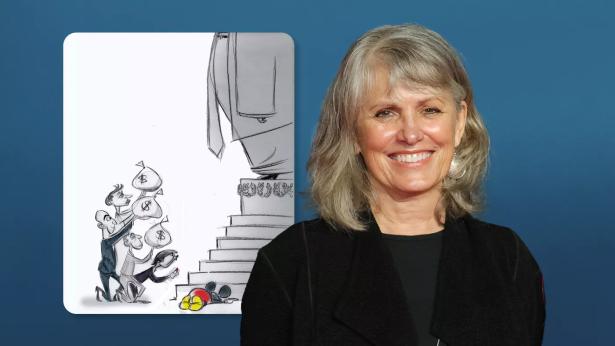- New Faces in the White House Briefing Room
- Hero Cartoonist Ann Telnaes Wins Pulitzer
- ‘Critics Say’ and Other Weasel Words
- Meta and Myanmar
- Holding Apple Accountable
- The Great AI Scare
- Global Press Freedom at All-Time Low
- Dereliction of Duty
- Defunding Public Media
- School Without Phones
New Faces in the White House Briefing Room
By Richard Luscombe
The Guardian
A disgraced ultra-conservative banjo player ousted from his Grammy-winning band; a far-right conspiracy theorist with alleged ties to Russia; and an extremist social media “influencer” once banned from Twitter for posting a video depicting sexual abuse of a child. These are just some of the “new media” personalities courted by the White House to take part in a series of “alternative briefings.”
Hero Cartoonist Ann Telnaes Wins Pulitzer
By Lisa Baumann
The Independent
A longtime editorial cartoonist for The Washington Post who quit in protest after editors killed her sketch of the newspaper’s owner and other media executives bowing before President Donald Trump, has won the Pulitzer Prize for illustrated reporting and commentary.
‘Critics Say’ and Other Weasel Words
By Mark Jacob
Stop the Presses
It’s a common issue in political journalism – whether to state something as objectively true or put an assertion “in someone else’s mouth.” The problem is that when journalists attribute a known fact to “critics,” it diminishes that fact, turning it into a mere opinion. And that benefits the bad guys.
By Tin Shine Aung
East Asia Forum
The launch of Meta's community-driven ‘Community Notes’ initiative, aimed at replacing third-party fact-checking, presents major risks for social sustainability and the safety of the Rohingya minority in Myanmar. Due to Facebook’s influential role in the country, this change could exacerbate the spread of hate speech and in-group policing.
By David Dane
The American Prospect
Epic Games took Apple to U.S. district court in a private antitrust case. As a result, Apple would have to allow app developers to communicate with consumers and direct them to alternative “purchasing mechanisms.” But Big Tech firms like Apple see these impositions only as minor obstacles to work around by devising more private rules to maximize profits.
The Great AI Scare
- The AI Dragnet By Sophia Goodfriend, Dissent
- Bubble Trouble By Bryan McMahon, The American Prospect
- Jobs Crisis By Samuel O'Brient, TheStreet
Global Press Freedom at All-Time Low
By Tanika Godbole
Deutsche Welle
Reporters Without Borders (RSF) said in its annual ranking report on Friday, particularly noting a deterioration under US President Donald Trump. RSF said its main index has fallen to its lowest-ever level in the 23 years that it has been tracking press freedom.
Media and Democracy
A president who refuses to explicitly commit to—or is ignorant of—his constitutional duties is a crisis and warrants prominent, persistent and ongoing follow-up news coverage. America is in a full-fledged constitutional crisis and editors are not sufficiently communicating this reality. By not doing so, these editors are failing to defend the Constitution through normalization.
Trump and his oligarchic allies have long bristled at even the most modest efforts of public broadcasting outlets and community media to hold the billionaire class, multinational corporations, and their congressional retainers to account.
Fit to Teach
This school year, students must hand in their phones at entry or we immediately call their parents. The phones are plugged into safe boxes that the students aren’t allowed to access until the final bell has rung. There are no constant vibrations reminding you you’re missing out on something.


Spread the word